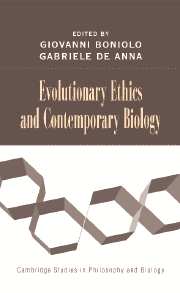Book contents
- Frontmatter
- Contents
- List of Contributors
- Evolutionary Ethics and Contemporary Biology
- Introduction
- PART I THE LIMITS OF EVOLUTIONARY EXPLANATIONS AND JUSTIFICATIONS OF ETHICS
- 1 Is Darwinian Metaethics Possible (And If It Is, Is It Well Taken)?
- 2 The Descent of Instinct and the Ascent of Ethics
- PART II METHODOLOGICAL ISSUES CONCERNING EVOLUTIONARY ACCOUNTS OF ETHICS
- PART III HOW BIOLOGICAL RESULTS CAN HELP EXPLAIN MORALLY RELEVANT HUMAN CAPACITIES
- PART IV HOW BIOLOGICAL RESULTS CAN HELP EXPLAIN MORAL SYSTEMS
- Index
- Cambridge Cultural Social Studies
- References
1 - Is Darwinian Metaethics Possible (And If It Is, Is It Well Taken)?
Published online by Cambridge University Press: 23 July 2009
- Frontmatter
- Contents
- List of Contributors
- Evolutionary Ethics and Contemporary Biology
- Introduction
- PART I THE LIMITS OF EVOLUTIONARY EXPLANATIONS AND JUSTIFICATIONS OF ETHICS
- 1 Is Darwinian Metaethics Possible (And If It Is, Is It Well Taken)?
- 2 The Descent of Instinct and the Ascent of Ethics
- PART II METHODOLOGICAL ISSUES CONCERNING EVOLUTIONARY ACCOUNTS OF ETHICS
- PART III HOW BIOLOGICAL RESULTS CAN HELP EXPLAIN MORALLY RELEVANT HUMAN CAPACITIES
- PART IV HOW BIOLOGICAL RESULTS CAN HELP EXPLAIN MORAL SYSTEMS
- Index
- Cambridge Cultural Social Studies
- References
Summary
Ethics is an illusion put in place by natural selection to make us good cooperators.
Ruse and Wilson 1985When I first started doing philosophy some forty years ago, evolutionary ethics was the philosophical equivalent of a bad smell. One knew that not only was it false, but somehow it was unclean – it was the sign that one had a tin ear for philosophy. Had not G. E. Moore in Principia Ethica shown that evolutionary ethics commits the greatest of all sins, that it ignores or plows through the “naturalistic fallacy”? Or, to put matters in a more historical context, did not evolutionary ethics violate the distinction drawn by David Hume between “is” and “ought”? Now, however, we have had something of a sea change, and it is almost the norm for philosophers interested in morality to admit, with greater or lesser enthusiasm, that evolution surely counts for something. But how much is that “something”? That is still the matter of debate.
NORMATIVE ETHICS
In dealing philosophically with morality, there are always two levels to be discussed: normative or substantive ethics, which deals with what one ought to do (“love your neighbor as yourself”), and metaethics, which deals with why one ought to do what one ought to do (“God wants you to love your neighbor as yourself”). If one is trying to link evolution and normative ethics, then most obviously one will be trying to show that human ethical relationships are produced by evolution.
- Type
- Chapter
- Information
- Evolutionary Ethics and Contemporary Biology , pp. 13 - 26Publisher: Cambridge University PressPrint publication year: 2006
References
- 20
- Cited by



